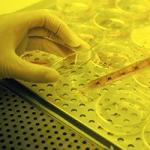
Darlene Dixon, D.V.M., Ph.D., D.A.C.V.P.
Senior Investigator
National Toxicology Program/Molecular Pathogenesis Group
NIEHS
Research Topics
Dixon’s group focuses on defining the pathogenesis/carcinogenesis of tumors affecting the reproductive tract of rodents and humans and assessing the role of environmental and endogenous hormonal factors in the growth of these tumors.
The group has used cell lines, 3D cultures, archival mouse tissue, and human clinical samples to study the influence of membrane-associated estrogen receptors and growth factors/receptors and their signaling pathways on uterine leiomyoma (fibroid) growth. Group members use leiomyoma and patient-matched myometrial samples, clinical tissues taken from cycle-staged, premenopausal women participating in the NIEHS George Washington University Fibroid Study. The rodent tissue samples are either from in-house studies or National Toxicology Program archives.
Dixon and her group seek to understand the basic molecular mechanisms of disease, which may lead to therapeutic interventions that generate alternative non-invasive treatments for clinical fibroids and other diseases affecting the female reproductive tract.
Biography
Dixon earned her Doctor of Veterinary Medicine (D.V.M.) degree in 1982 at Tuskegee University School of Veterinary Medicine and her Ph.D. in 1985 at Michigan State University. She also completed a postdoctoral fellowship at The Rockefeller University, Laboratory Animal Research Center. Dixon received her board certification from the American College of Veterinary Pathologists (ACVP) in 1987 and joined NIEHS the same year.
Selected Publications
- Liu J, Yu L, Castro L, Yan Y, Bushel P, Scappini E, Dixon D. Induction of fibrosis following exposure to bisphenol A and its analogues in 3D human uterine leiomyoma cultures. J Hazard Mater. 2024;476:134772.
- Mark ZA, Yu L, Castro L, Gao X, Rodriguez NR, Sutton D, Scappini E, Tucker CJ, Wine R, Yan Y, Motley E, Dixon D. Tobacco Smoke Condensate Induces Morphologic Changes in Human Papillomavirus-Positive Cervical Epithelial Cells Consistent with Epithelial to Mesenchymal Transition (EMT) with Activation of Receptor Tyrosine Kinases and Regulation of TGFB. Int J Mol Sci. 2024;25(9).
- Liu J, Yu L, Castro L, Yan Y, Clayton NP, Bushel P, Flagler ND, Scappini E, Dixon D. Short-term tetrabromobisphenol A exposure promotes fibrosis of human uterine fibroid cells in a 3D culture system through TGF-beta signaling. FASEB J. 2022;36(2):e22101.
- Yan Y, Shi M, Fannin R, Yu L, Liu J, Castro L, Dixon D. Prolonged Cadmium Exposure Alters Migration Dynamics and Increases Heterogeneity of Human Uterine Fibroid Cells-Insights from Time Lapse Analysis. Biomedicines. 2022;10(4).
- Dunnick JK, Schmitt CP, Dixon D. A Review of the Most Frequent Compounds, Metals, and Compound and Metal Mixtures Found at U.S. Superfund Sites and Their Carcinogenic Potential. Chem Res Toxicol. 2025;38(6):963-974.
Related Scientific Focus Areas



Molecular Biology and Biochemistry
View additional Principal Investigators in Molecular Biology and Biochemistry

This page was last updated on Wednesday, September 4, 2019